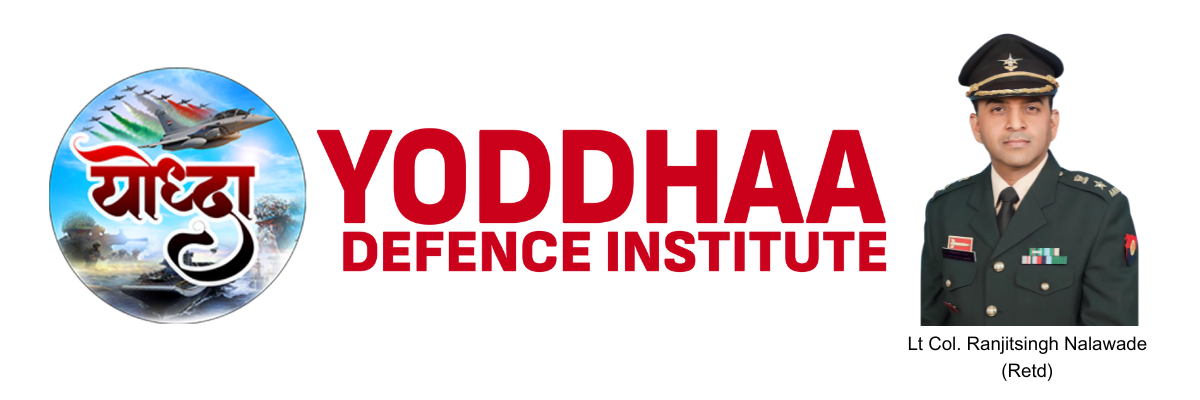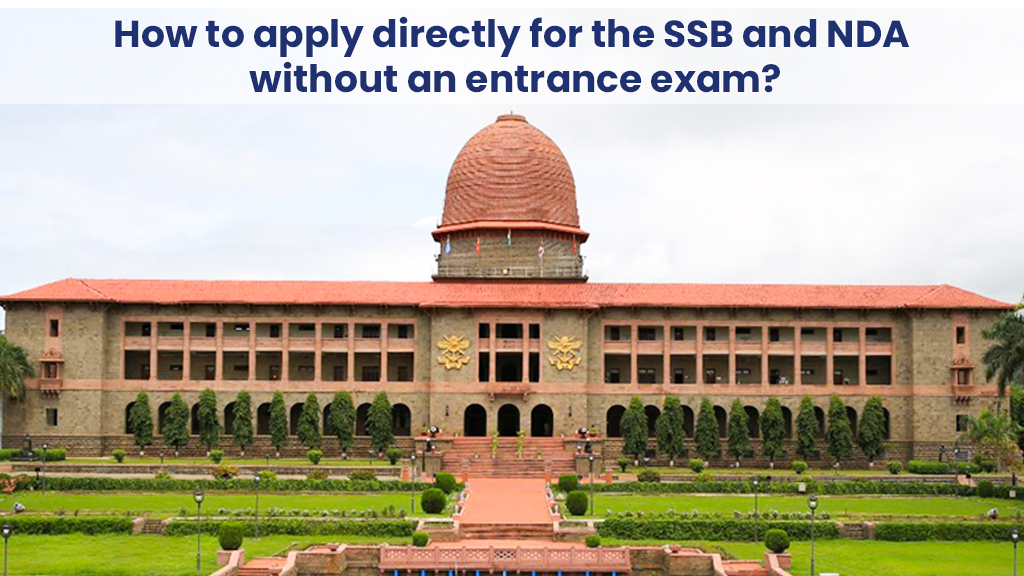The conventional route to the Indian Armed Forces has traditionally been through competitive examinations, specifically the National Defence Academy (NDA) entrance examination and subsequent Services Selection Board (SSB) interviews.
There is, however, an alternate route that avoids the grueling written tests. This direct entry route utilizes exceptional skills in the form of academics, sports, engineering, or even leadership, thus shortening the recruitment process for specialist candidates.
Regardless of whether you are a high-achieving student with an excellent NCC record, an engineering graduate or a law graduate with ambitions to work in the military legal service, the direct entry route could be your entry point to serving your country.
The Traditional Route
Most job applicants willing to join the army have depended on the conventional system that begins with a very competitive written examination, the national defence academy exam.
This exam is famous for having a tough syllabus, in which success is dependent on top notch preparation and performance. Although this process has been the backbone for recruitment, it is not the sole route.
For the perhaps less conventional student or examination-oriented candidate, direct entry routes offer a legitimate option. These schemes are based on evidence of excellence across a broad spectrum of subjects enabling candidates to present their talents and by-pass the written part of the process entirely.
Not only does this enhance the recruitment pool but also guarantees that the armed forces draw upon a wide assortment of aptitudes.
Understanding Direct Entry Pathways
Direct entry to the SSB and NDA is particularly aimed at candidates who have excelled in specific fields.There have been different schemes initiated by the government to identify and recruit the best-class candidates without conducting a pre-written exam. We are going to discuss the most common direct entry schemes available below.
1. Direct Entry for Exceptional Talent
Some direct entry schemes are created for those candidates who possess exceptional achievements at sports, academics, or extracurricular activities. Vacancies under this category are reserved by the government for candidates who prove excellence at national or international levels.
- Eligibility Criteria:
- Achievements: The individuals should possess remarkable achievements in established disciplines (e.g., sport, study, arts).
- Age Requirements: Age group tends to lie within typical ranges indicated for the NDA, generally ranging between 16 and 19 years.
- Educational Qualifications: Pass in the 10+2 or equivalent exam tends to be compulsory.
- Application Process:
- Evaluation of Credentials: Document and identify your achievements with authentic certificates and testimonials.
- Direct Communication: Contact the concerned authorities (such as the UPSC or Ministry of Defence) for details on the direct entry application process.
- SSB Interview: If your credentials are in line with the eligibility criteria, you can be directly invited for the SSB interview.
- Medical Checkup and Last Choice: Final phases consist of a strict medical checkup followed by selection based on merit.
This path is particularly appealing for individuals who have exceptional skills in fields where standard tests cannot identify their full capabilities.
2. Direct SSB Interview Entry
Some direct entries enable applicants to skip the written test completely and directly show up for the SSB interview. Such entries are done with the aim to gauge a candidate’s leadership potential, communication skill, and overall compatibility for becoming a part of the military forces.
- Simplified Procedure:
Through Direct SSB entry, preparation for the written test is eliminated, and valuable time is spared and utilized in a more worthwhile manner through group working and personality development.
- Based on Specialized Skill Sets:
Candidates possessing specialized qualifications (e.g., engineering, law, or NCC qualifications) are automatically deemed to have qualified based on natural ability.
- Case Studies and Real-Life Applications:
Most candidates who have availed themselves of the direct SSB route report that their performance at direct SSB entries is supplemented by prior success and hard training in special skills.
3. Engineering and Technical Entries
For technocrats, the army has several specialized direct entry schemes that do not go through the conventional written tests. These not only test technical skills but also leadership skills.
SSC Tech Entry
Target Group: Students pursuing engineering or BE/B.Tech final-year studies.
- Eligibility:
- Minimum aggregate (typically 55-60%) in the BE/B.Tech degree.
- Age limit is generally between 20 and 27 years.
- Selection Process:
- Applications are shortlisted on the basis of academic record.
- The candidates selected are directly invited to the SSB interview and also a thorough medical check-up.
This route is meant to achieve the technical necessity of different wings in the military while ensuring proper standards of command and operational capabilities.
Technical Graduate Course (TGC)
- Process and Training:
- Same eligibility like SSC Tech intake but usually tends to stress loyalty towards long terms of service.
- The selection involves a rigorous technical and leadership skill assessment, and then SSB interviews and a specialized training at institutions such as the Indian Military Academy (IMA).
Technical Entry Scheme (TES)
- For Junior Candidates:
TES entry is a wonderful opportunity for students fresh from school (post-Class 12) with brilliant performance in Physics, Chemistry, and Mathematics.
- Eligibility:
- Age group of 16 to 19 years.
- A minimum aggregate in PCM with a qualifying score in the JEE Mains.
- Process:
- Shortlisting is done on academic grounds and then directly invited to the SSB interview without conducting a written test.
- This scheme is extremely helpful for those candidates who have demonstrated academic brilliance right from the start and wish to join a technical career in the Indian Army.
4. NCC-Based Direct Entry
The National Cadet Corps (NCC) offers one of the most popular direct entry schemes into the military. The scheme aims at acknowledging the training, discipline, and leadership NCC cadets attain.
- Eligibility:
- The candidate should have a minimum of a ‘C’ certificate in NCC.
- The age range is usually 19–25 years.
- There is a minimum educational requirement (usually a bachelor’s degree) for short service commission entries.
- Process:
- NCC credentials of the candidate are authenticated.
- Recommended candidates are subsequently directly called for SSB interview without taking a written test.
This path not only appreciates previous military training but also capitalizes on the organizational and leadership skills developed through NCC service.
5. JAG Entry for Law Graduates
For law graduates who wish to join the armed forces, the Judge Advocate General (JAG) entry provides a direct entry into the legal branch without having to take the normal written tests.
- Eligibility:
- Applicants must possess a recognized LLB degree with a minimum aggregate mark (typically 55%).
- Registration with the Bar Council is usually necessary.
- The age limit is usually between 21 and 27 years.
- Selection Process:
- Shortlisting of applications is done on the basis of academic merit and knowledge of law.
- Shortlisted candidates undergo the SSB interview, after which they go through a medical examination to assess fitness.
- The shortlisted applicants are invited to the SSB interview, which is followed by a medical test.
This direct entry scheme allows the armed forces to obtain high-calibre legal professionals who will be able to handle military justice and allied legal matters.
Preparing for SSB Interview and Enhancing SSB Qualification
Direct entry schemes enable the candidates to skip the nda entrance exam or equivalent written exams but the SSB interview is still a crucial milestone.
Clearing the SSB interview needs intense preparation and self-upgradation in all aspects:
1. Developing Effective Communication Skills
- Significance:
Good verbal and non-verbal communication is key to SSB selection. Interviews tend to measure your thought articulation, team work, and leadership potential.
- Tactics:
- Take up public speaking, debate clubs, or group discussions.
- Practice responding to typical interview questions clearly and concisely.
2. Physical Fitness and Health
- Role in SSB Qualification:
Physical fitness is a pre-requisite. Physical requirements are stringent, and candidates are tested for the same in the SSB process.
- Tips to prepare:
- Create a regular exercise regimen comprising cardio, strength training, and flexibility exercises.
- Adhere to a healthy diet and lead an active lifestyle to maintain overall fitness.
3. Psychological and Group Tasks
The SSB interview is not solely personal interviews but also involves psychological tests and group exercises that check teamwork, problem-solving, and leadership.
- Preparation Techniques:
- Practice mock SSB interviews or group exercises.
- Enroll in specialized coaching or training classes that deal specifically with SSB preparation.
Comparative Analysis: Direct Entry vs. Traditional Written Exams
Each of the direct entry routes and the traditional written exam route possesses its own strengths and weaknesses.
Here’s a brief comparative overview:
- Time Efficiency:
Direct entry schemes save time by avoiding the need of extensive written exam preparation. This can be especially beneficial for candidates who have already proven themselves in other areas.
- Focused Skill Evaluation:
Direct selection focuses on functional skills, leadership abilities, and technical skills in the field, more so than academic achievement. This results in an improved overall analysis of whether or not the applicant is fit to pursue a military career.
- Competitiveness and Stress:
Skipping the written test might relieve some pressure but the SSB interview itself is very competitive and challenging. Candidates need to be as well-prepared to deal with group activities, psychological assessments, and individual interviews.
- Eligibility Criteria and Selection Flexibility
Direct entry schemes often have specific eligibility criteria (e.g., NCC certification, technical qualifications, legal degrees) that cater to niche talents.This provides more varied opportunities for candidates with different educational backgrounds.
Conclusion
The direct entry routes to the Indian Armed Forces are a paradigm shift in recruitment. By bypassing the traditional nda entrance exam, ssb entrance exam route, people with better talents and specialized skills can directly prove their mettle at the SSB interview level.
Regardless of whether you are a high-achieving student, a technical graduate, an NCC cadet, or a law graduate, these other routes offer a streamlined path to become part of the elite group of the Indian Army.
Takeaways are:
- Eligibility and Documentation:
Having all documents ranging from academic records to extracurricular activities in order is essential to get an interview call.
- Focused Preparation for SSB Interview
As the SSB interview is the turning point, it is imperative to prepare intensively for group exercises, personal interviews, and psychological tests. Improving communication skills, being physically fit, and keeping oneself abreast of current affairs are all vital components.
- Advantages Over Traditional Channels:
Direct entry programs alleviate stress and lost time on paper-based tests and value skills gained practically and specialist skills.
- The Contribution of New Age Platforms:
With the selection process evolving further, reaching Yoddhaa offers a head start with respect to custom mentoring, latest information, and synchronized preparation units.
Ultimately, the direct recruitment process is an expert path which recognizes brilliance within certain domains. It is reflective of India’s desire to diversify the expertise and ensure that future commandants are suitably equipped with technical consciousness and leadership.
Yoddhaa Defence Academy keeps its users informed regarding exam notice updates, modifications in the eligibility criteria, and step-by-step analysis of interview procedures which are all part of the entire SSB qualification process. This helps the candidates stay ready for any shift in recruitment trends.
Because Yoddhaa lays great stress on soft skills, leadership development, we offer IIT-JEE Training in Pune and are also located in Nanded.

